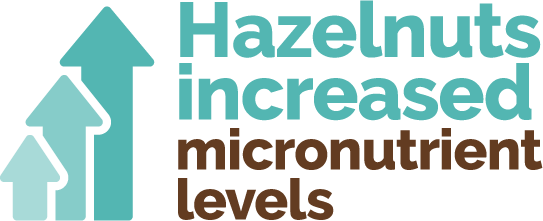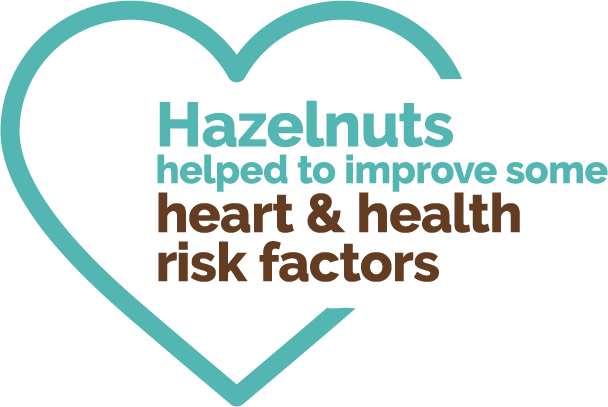Nutrition & Health

Hazelnuts aren’t just tasty; they’re tiny powerhouses of nutrition! Emerging science shows that munching on hazelnuts may reduce cholesterol and support overall health, while helping to keep your diet on track—without worrying about extra pounds. Think of them as your heart and metabolism’s crunchy little sidekicks, ready to support your health with every bite. So go ahead, toss some into your next snack or meal—your body will thank you!


Just one ounce of hazelnuts provides more protein, Vitamin E, copper, and magnesium than a whole avocado and they are a concentrated form of healthy fats.
- Hazelnuts are a good source of healthy fiber.
- Hazelnuts have more copper than spinach.
- Hazelnuts have a very high antioxidant value.
- Hazelnuts excel in copper and manganese.
- Hazelnuts contain heart-healthy monounsaturated fats.
- Hazelnuts are lower in carbohydrates than many seeds.



Hazelnuts might just be your heart’s new best friend! A major analysis of nine studies found that adding these crunchy little wonders to your diet can significantly lower bad cholesterol (LDL), dropping levels by -0.150 mmol/L. And here’s the kicker—hazelnuts won’t mess with your waistline, since they had no significant impact on body weight.

Hazelnuts might just be the secret weapon for boosting essential nutrients! A study from Oregon State University had 32 participants, all aged 55 and better, munch on about 57 grams of hazelnuts every day for 16 weeks. The results were impressive, showing micronutrient levels increased. Blood levels of magnesium shot up, and a vitamin E metabolite showed clear signs of improved vitamin E status. What’s more, participants saw drops in fasting glucose and LDL cholesterol, which are big wins for overall health.

A major review looked at 22 studies to see how these nutrient-rich nuts impact important health markers, from cholesterol and blood pressure to inflammation and even antioxidant levels. The results? Hazelnuts helped improve several cardiometabolic risk factors, making them a smart addition to any diet. Even better, eating them regularly didn’t lead to weight gain or body changes, and people enjoyed hazelnuts, so they continued to snack on them over time—proof that hazelnuts are easy (and delicious) to enjoy long-term!


Several pivotal nutrition studies have highlighted the health benefits of tree nut consumption, including hazelnuts, encompassing cardiovascular health, metabolic function, and longevity. Here’s a summary of key findings.

Data from the NHANES survey (1999-2002) showed a positive association between nut and seed intake and telomere length, a biomarker of cellular aging. For each 1% increase in energy intake from nuts and seeds, telomere length increased by approximately 5 base pairs, suggesting a potential role in promoting longevity.
A Harvard study published in the New England Journal of Medicine found that tree nut consumption, including hazelnuts, was associated with reduced mortality. The study analyzed data from the Nurses’ Health Study and the Health Professionals Follow-up Study, encompassing more than 118,000 participants. It assessed the impact of nut consumption on total and cause-specific mortality, adjusting for various lifestyle and dietary factors.
The research found that higher nut consumption was inversely associated with total mortality, with participants consuming nuts seven or more times a week having a 20% lower risk of death compared to those who did not consume nuts.
Association of Nut Consumption with Total and Cause-Specific Mortality. doi: 10.1056/NEJMoa1307352
New England Journal of Medicine
An umbrella review encompassing 89 studies published in Advances in Nutrition found that a daily intake of 28 grams of nuts is associated with:
- 22% reduction in all-cause mortality
- 21% reduced risk of cardiovascular disease
- 11% lower risk of cancer mortality
Nut consumption also correlated with decreased mortality from respiratory and infectious diseases. However, associations with diabetes incidence were mixed. The benefits were consistent across various nuts, including hazelnuts.
Consumption of Nuts and Seeds and Health Outcomes Including Cardiovascular Disease, Diabetes and Metabolic Disease, Cancer, and Mortality: An Umbrella Review. doi: 10.1093/advances/nmac077


A 2015 analysis of NHANES data (2005-2010) revealed that adults consuming at least ¼ ounce of tree nuts daily exhibited:
- Lower body mass index (BMI) and waist circumference
- Reduced systolic blood pressure
- Improved insulin sensitivity
- Higher HDL (“good”) cholesterol levels
These individuals also had a 25% lower likelihood of obesity and a 23% lower likelihood of being overweight or obese.
Tree Nut consumption is associated with better adiposity measures and cardiovascular and metabolic syndrome health risk factors in U.S. Adults: NHANES 2005–2010. oi: 10.1186/s12937-015-0052-x
BioMed Central


A pooled analysis from three large prospective cohort studies that was published in the Journal of the American Heart Association indicated that consuming nuts five or more times per week was associated with:
- 14% lower risk of cardiovascular disease
- 20% lower risk of coronary heart disease
These findings underscore the heart-protective effects of regular nut consumption.
Changes in Nut Consumption and Subsequent Cardiovascular Disease Risk Among US Men and Women: 3 Large Prospective Cohort Studies. doi.org/10.1161/JAHA.119.01387
Cardiovascular disease (CVD) is the general term for all diseases involving the heart and blood vessels.
Coronary heart disease is the most common type of CVD. It affects the coronary arteries, which supply blood to the heart.


